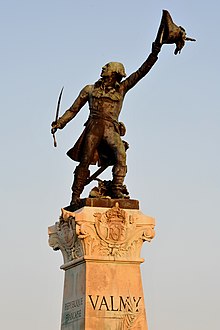September 20, 1792:
The Battle that Saved the Revolution
The Battle that Saved the Revolution
 The following account of the Battle of Valmy comes from our book, Light to the Nations II: The Making of the Modern World. For ordering information on this text and our other books, please click here.
The following account of the Battle of Valmy comes from our book, Light to the Nations II: The Making of the Modern World. For ordering information on this text and our other books, please click here.
In the months following the overthrow of the king, France fell into anarchy. Deep divisions (the Girondins against the extremists, the departments against Paris, and royalists against the revolution) destroyed all order. The French army seemed to be disintegrating; and everything was thrown into confusion by the news that on August 19, 1792, Lafayette had deserted the army he commanded and fled to the Austrians. The same day, the allied armies for the first time crossed the French frontier. After capturing the town of Langwy, the Duke of Brunswick laid siege to Verdun, the last major stronghold before Paris. The enemy stood about 150 miles from the capital.
 In Paris, Danton, as the leader of the Executive Council, was trying to unite the factions and bring order to government. He could do little. Anger and hate and fear were at a fever pitch. Without Danton's knowledge, a plot was set afoot. Shortly after the king's imprisonment, the Executive Council had ordered the imprisonment of all those who were suspected of sympathy with Louis XIV and the invaders. Well over a thousand men and women, including nobles and priests, had been incarcerated. Now a band of extremists, led by Marat, plotted to do "justice" on these so-called traitors and counterrevolutionaries.
In Paris, Danton, as the leader of the Executive Council, was trying to unite the factions and bring order to government. He could do little. Anger and hate and fear were at a fever pitch. Without Danton's knowledge, a plot was set afoot. Shortly after the king's imprisonment, the Executive Council had ordered the imprisonment of all those who were suspected of sympathy with Louis XIV and the invaders. Well over a thousand men and women, including nobles and priests, had been incarcerated. Now a band of extremists, led by Marat, plotted to do "justice" on these so-called traitors and counterrevolutionaries.
On September 2, 1792, an armed mob attacked and killed 24 nonjuror priests who were being led to the national prison of the revolutionary government. Thus began the September Massacres. Over the next several days, a group of 150 conspirators visited the prisons of the city and murdered political prisoners, both men and women. In many cases, the conspirators set up revolutionary tribunals to try the prisoners, all of whom were found guilty of treason and executed. Though the people of Paris beheld all this with loathing, they did nothing -- nor could the civil authorities do anything -- to stop the massacres. Over the course of several days, 1,200 prisoners -- 220 of them priests -- were brutally murdered.
 |
| The September Massacres |
While this butchery was going on, news reached Paris that, on September 2, Verdun had fallen to the enemy. The allies were preparing to march on Paris. Charles François Dumouriez, a Girondin whom Danton had made commander of the army after Lafayette's defection, was ordered by the government to block the allied advance against Paris.
An able commander, Dumouriez placed his motley band of French volunteers at three passes that pierce the forested hills of the Argonne, between Verdun and the capital. Dumouriez's troops, however, could not stand up for long against the well-disciplined Austrian and Prussian troops. The enemy, pushing through two of the passes, forced the French to retreat south to the main road leading to Paris. But Dumouriez was determined not to flee before the enemy. On September 19, joined by General François Christophe Kellerman and his troops, Dumouriez formed his forces on a small rise, standing before the village of Valmy.
The allies, who had pursued the French through the passes of the Argonne, had formed up in a position between Paris and Dumouriez's forces. The morning of September 20, 1792, broke misty; but despite the poor visibility, French and Prussian artillery began firing on one another. Soon, Austrian artillery joined the duel. Around noon, or shortly thereafter, the Prussian infantry massed for an assault on the French position.
 |
In the face of French fire, the well-disciplined Prussians pushed forward against their enemy's position; closer and closer loomed the hill where the French had clustered. But then, inexplicably, the Prussian advance halted; and then, with good discipline, the Germans withdrew. The assault had been called off. It is uncertain why. It may be that the ground the Prussians had to move over was judged to be too soaked and muddy or that the French fire was too deadly. Whatever the cause, the battle at Valmy ended with the calling off of the assault. The French still held their position on the hill. The Prussians and Austrians encamped below them on the plain.
For the next week, the allies and the French faced off, but there was no fighting. Seeing an opportunity, Danton sent agents from Paris to negotiate with the allied commanders. The Prussians and Austrians both were suffering from dysentery. Winter was coming on, and the allied supply line was long and not well protected. With the allies in such difficulties, Danton's agents were able to strike a bargain. On September 30, the Prussian and Austrian commanders agreed to a retreat. A little over three weeks later, the allied armies had crossed the border again into Germany.
 |
| Battle of Valmy |
The battle at Valmy, along with Danton's negotiations, saved the French Revolution. On the very day of the battle, the Legislative Assembly had met for the very last time. Two days later, on September 22, the new government, the National Convention, proclaimed the founding of the Republic.
Valmy and the Republic! The battle had not only saved the revolution, but had inspired the French people with new confidence. They had stood up against the Prussians, the greatest army in Europe! What more could they not do? The Republic gave many Frenchmen a cause to fight for; they dreamed of taking the revolution to all of Europe. They would lead a crusade for "liberty, equality, and fraternity" -- the secular salvation of mankind.
No comments:
Post a Comment